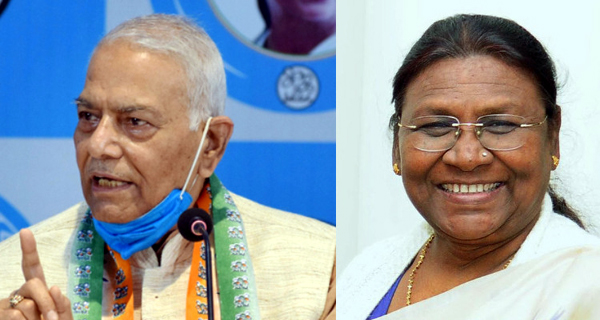Sinha set to get 2100 votes, Murmu 1400 from UT
*JK not to be part of exercise for second time in history
Sanjeev Pargal
JAMMU, June 23: With battle lines drawn for the Presidential election on July 18, Opposition candidates Yashwant Sinha is likely to get 2100 votes from Jammu and Kashmir while her rival and formidable candidate of BJP-led NDA Draupadi Murmu is set to fetch 1400 as 9280 votes of the Union Territory will be lost in the absence of elected Assembly and no representative of the UT in Rajya Sabha.
Only five Lok Sabha members from Jammu and Kashmir will be eligible to cast their votes for the 15th Presidential election on July 18. Counting is scheduled for July 21 while President Ram Nath Kovind will complete his term on July 25.
Five MPs who will cast votes for the Presidential election from J&K are Union Minister of State in the Prime Minister’s Office (PMO) Dr Jitendra Singh and Jugal Kishore Sharma, both from BJP, and Dr Farooq Abdullah, Mohammad Akbar Lone and Hasnain Masoodi, all three of National Conference.
Masoodi told the Excelsior that Yashwant Sinha is the joint Opposition candidate and the National Conference MPs will vote for him.
Each MP has vote value of 700 which means Sinha will get 2100 votes from Jammu and Kashmir while Murmu will secure 1400.
Vote value of Jammu and Kashmir MLAs till it was a State was 72. With J&K having been allotted 90-member Assembly, its MLAs would have 6480 votes, all of which will be lost as the UT doesn’t have an elected Legislature due to delay in conduct of the Assembly polls.
Further, Jammu and Kashmir will also be deprived of 2800 votes as it has no representation in Rajya Sabha in absence of the Assembly.
J&K has four Rajya Sabha seats and each MP has 700 vote value.
“With no Legislative Assembly and nil representation in Rajya Sabha, Jammu and Kashmir will not be able to cast 9280 votes in the Presidential election,” sources said.
The Legislative Assembly of the Union Territory of Jammu and Kashmir will not be a part of Presidential election exercise for the second time in the history of the election to the top Constitutional post.
There have been precedents of Legislative Assemblies of States not being part of the Presidential polls on account of their dissolution, the first such instance being of Gujarat in 1974.
The Assemblies of Assam, Nagaland and Jammu and Kashmir too could not participate in subsequent elections on account of dissolution.
In the present case, the Legislative Assembly of Jammu and Kashmir is yet to be constituted after the erstwhile State was bifurcated into the Union Territories of Jammu and Kashmir and Ladakh in 2019.
The Jammu and Kashmir Reorganisation Act provides for a Legislative Assembly for the Union Territory of Jammu and Kashmir, but the election is yet to be held due to various reasons. Ladakh has been granted the UT without Legislature.
In 1992, the Legislative Assemblies of Jammu and Kashmir and Nagaland were dissolved and thus, could not be part of the 10th Presidential polls that elected Shankar Dayal Sharma to the top Constitutional post.
In 1992, Jammu and Kashmir had gone unrepresented in the Presidential polls as the election to the Lok Sabha too could not take place in the erstwhile State in 1991 due to insurgency.
“The value of the vote of an MP in a Presidential election is linked to the number of elected members in the Legislative Assemblies of States and Union Territories including Delhi, Puducherry and Jammu and Kashmir. J&K presently doesn’t have the Assembly,” sources said.
Vote value of the MP for Presidential election was earlier 708 which has come down to 700 because of no Assembly in Jammu and Kashmir.
The Electoral College for the President’s election comprised Lok Sabha and Rajya Sabha MPs and MLAs of States and Union Territories. The MLCs as well as nominated MLAs don’t have voting right in the Presidential poll.


